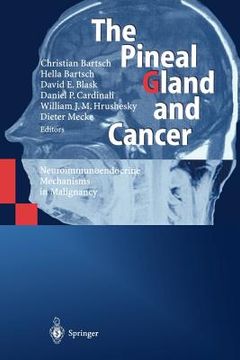Share
the pineal gland and cancer: neuroimmunoendocrine mechanisms in malignancy
C. Bartsch
(Illustrated by)
·
H. Bartsch
(Illustrated by)
·
D. E. Blask
(Illustrated by)
·
Springer
· Paperback
the pineal gland and cancer: neuroimmunoendocrine mechanisms in malignancy - Bartsch, C. ; Bartsch, H. ; Blask, D. E.
Choose the list to add your product or create one New List
✓ Product added successfully to the Wishlist.
Go to My Wishlists
Origin: U.S.A.
(Import costs included in the price)
It will be shipped from our warehouse between
Monday, June 17 and
Wednesday, July 03.
You will receive it anywhere in United Kingdom between 1 and 3 business days after shipment.
Synopsis "the pineal gland and cancer: neuroimmunoendocrine mechanisms in malignancy"
Three years ago, most authors contributing to this book gathered at the Heinrich Fabri Institute of the University of Tübingen at Blaubeuren near Ulm in Germany for the third conference on "Pineal Gland and Cancer". In 1987, the late Derek Gupta organized the second meeting and published the first book on the topic, 10 years after Vera Lapin, as part of the 25th anniversary celebrations of the Vienna Cancer Research Institute, had held the first meeting. It was in Vienna during the 1930s and 1940s that W. Bergmann and P. Engel demonstrated that pineal extracts possess growth inhibitory properties on experimental rodent tumors and R. Hofstätter reported favorable results when these extracts were given to cancer patients. In the 1970s, Vera Lapin and others reported that surgical removal of the pineal gland (pinealectomy) stimulates experimental tumor growth rendering fundamental support for an involvement of the pineal gland in malignancy. A focal question of past and present research in this field is whether the pineal gland exerts its tumor inhibitory activity primarily or exclusively via melatonin. Currently, it appears that the action of melatonin on experimental tumor growth criti- cally depends on the circadian timing of its administration as weH as on the type and stage of cancer, and that primarily highly differentiated tumor ceHs are controHed. Initial clinical applications of the pineal hormone for incurable cancers raise hopes for a promising future use, particularly when combined with other therapies (e. g.
- 0% (0)
- 0% (0)
- 0% (0)
- 0% (0)
- 0% (0)
All books in our catalog are Original.
The book is written in English.
The binding of this edition is Paperback.
✓ Producto agregado correctamente al carro, Ir a Pagar.

